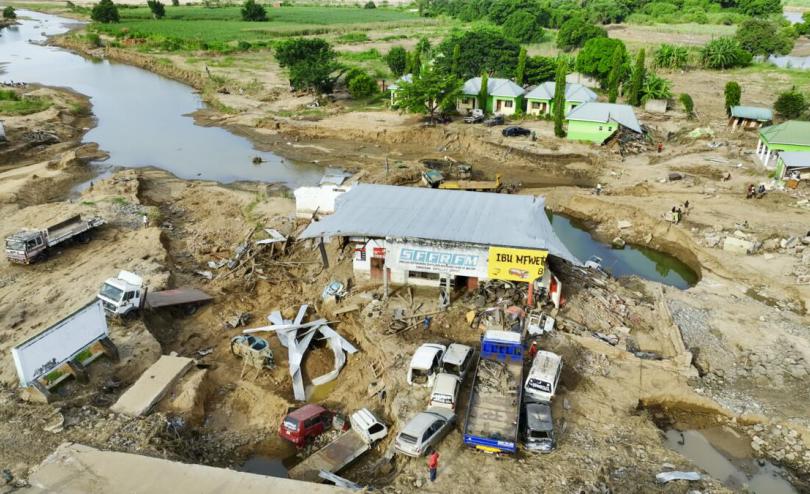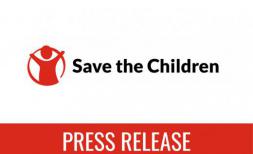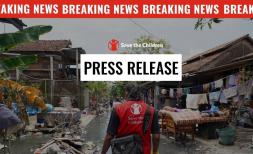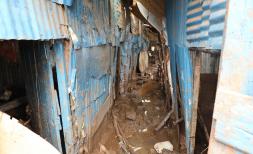A Tale of Two El Niños: Malawi underwater while neighbour Zambia dries out

LILONGWE/LUSAKA, 15 March 2024 – Two neighbouring southern Africa nations are battling completely opposite weather disasters this month, with Zambia experiencing its worst drought in two decades while Malawi battles floods that have displaced thousands, Save the Children said.
Rains have failed in Zambia for seven weeks consecutively at a time when farming families needed it most, with almost half of the nation’s planted area destroyed, according to the Zambian President. Farming families have lost one million hectares (2.5 million acres) from 2.2 million planted crops due to the influence of El Nino on the 2023-2024 rainy season, with the prolonged dry spell decimating crops and drying up water sources.
In neighbouring Malawi, heavy rainfall in the central parts of the country led to the death of six people last week, including two children after their houses were washed away by raging floods. The heavy downpour has caused widespread flooding and displaced more than 14,000 people in Nkhotakota District, with several areas cut-off after floodwaters destroyed roads and other infrastructure including critical bridges. The current rains are devastating the same communities who were heavily impacted by Cyclone Freddy last year.
At least nine schools are being used as camps for displaced families, affecting access to education for thousands of children. Fears of disease outbreaks including malaria are spreading fueled by congestion and poor sanitary conditions in the camps.
Save the Children is calling for urgent national and international intervention to provide families and children with basic services including food and water in Zambia and Malawi. Many of the displaced families forced to move to higher ground in Malawi, including hundreds of children, are now in critical need of emergency supplies like food, shelter, clean water, and toilets.
READ MORE: What is El Nino and how will it impact children around the world?
James* is a 14 -year-old boy from Nkhotakota district in Malawi. He is now living with his parents and young brother in a camp for displaced people after extreme floods engulfed their home and thriving grocery store in the village.
He told Save the Children: “At first, I thought my younger brother had wet the bed, then we discovered water had flooded our room. Hurriedly, we alerted our parents and realized the extent of the devastation as we made our way to higher ground. Our kitchen was gone, and our entire village was being engulfed by the rising waters.
“In the rush to escape, we salvaged only a few belongings, losing everything else, including my personal possessions. My father was successful businessman (who) operated a thriving grocery store in our village, but it too was swept away. Our family, once secure and prosperous, now faces an uncertain future.”
Lucy*, 13, is also living in a camp for displaced children with her family in Malawi. She said:
“The flooding took away everything from me. Life in the camp is really boring. I don't have any friends here, and I don't have any clothes. I want to go back home and go back to school. School is very exciting for me. I wish I could have a uniform, pens, and books so I can go back to school.”
The severe drought in Zambia and floods in Malawi are the latest in a series of extreme weather events in recent years to hit the southern Africa, where children and communities are grappling with the global climate crisis.
The El Niño weather phenomenon, which has brought the unusually heavy rains, thunderstorms and extreme floods in some countries while causing extreme droughts in others, is destroying lives and livelihood in southern Africa, with its impact being exacerbated by the climate crisis.
In Malawi, the El Niño impact is hitting after a prolonged period of unmet needs for communities, with alarming levels of food insecurity. Malawi is estimated to have 4.4 million people or 22 percent of the population facing crisis levels of food shortages and worse between October 2023 and March 2024. Unless response is urgently scaled-up, the situation will deteriorate further, the aid agency said.
Jo Musonda, Save the Children Country Director in Zambia, said:
“Zambia is going through one of the worst dry spells in decades due to the El Niño climate pattern and the biggest fear is that this will lead to a drastic spike in hunger, malnutrition, water scarcity and disease outbreaks. Families and children in areas such Western Province are already scavenging for wild fruits and roots which can sometimes be poisonous, and the most affected children are also missing class due to hunger.
“For small scale famers who have lost their livelihood, this is only going to deepen poverty and inequality and will hit the most vulnerable communities - especially the children the hardest. We are calling on the government and aid actors in the region to make information readily accessible to the communities concerning El Niño and how it will affect their livelihoods.”
Save the Children’s Malawi Country Director, Ashebir Debebe said:
“We know that children are always the hardest hit in climate crises. In Malawi’s flooded districts, children have been forced out of their homes and are going for days without school. With lessons from the impacts of El Niño in the past, failure to act, and act promptly, will place millions of children at risk in terms of their long-term well-being and future development.
“Save the Children is calling for urgent funds to be made available to provide basic services including food and shelter to families and communities uprooted from their homes by extreme flooding.”
Save the Children is implementing a smart climate sustainable agriculture project in Malawi to enhance resilience of vulnerable communities to climate change in Traditional Authorities Malengachanzi and Mwansambo in Nkhotakota district.
Save the Children has been in Malawi since 1983 and currently works in 20 of the country’s 28 in areas of health, education, food and livelihoods security and child protection. In Zambia, Save the Children has been working for 40 years, running health, nutrition, education, and protection programmes across the country. In response to the climate crisis, Save the Children is supporting children and their families impacted by drought and floods, providing education support, emergency cash and voucher assistance and school feeding programmes.




